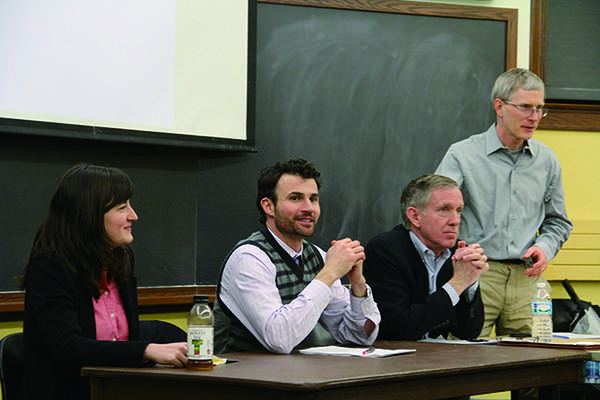Panel discusses pros and cons of divesting from fossil fuels

Sean Hong/Daily Senior Staffer
Panelists discuss whether Northwestern should continue to invest in fossil fuels. Northwestern University Responsible Endowment Coalition hosted the event Thursday night in Harris Hall.
February 20, 2014
The Northwestern University Responsible Endowment Coalition sponsored a panel Thursday on whether universities have an obligation to divest from fossil fuels.
About 50 students attended the event in Harris Hall, titled “Cutting out Coal,” where members of the panel argued for and against changing the University’s investment portfolio.
The panel featured Rob Whittier, director of the 0ffice of sustainability; Will McLean, NU’s chief investment officer and Kelly Mitchell, a coal campaigner at Greenpeace.
The discussion was planned as a result of a petition that urged members of the community to show their support for investment in green and sustainable technologies, which was sent out last year by the the Coalition and Associated Student Government .
Mitchell said besides the negative environmental impact, NU should not invest in the coal industry due to financial reasons, highlighting that coal companies have lost 70 percent of their value.
“(Coal companies) have a business model incompatible with our future,” she said.
She said the industry is already constrained by tougher national and international policies on carbon output, and fossil fuels are increasingly difficult to extract.
McLean said NU currently has about $31 million in private investments tied up in coal, and the University’s energy portfolio has been the best performing over the past few years, even during the financial downturn. He also questioned the impact of divestment for publicly traded companies.
“Even if it’s down 70 percent, somebody is going to buy coal until it becomes uneconomical,” McLean said. “Just by selling them, somebody is going to buy it, and Harvard’s president made the same point. If Northwestern sells, maybe we feel good about it. But what are we really accomplishing?”
Economics Prof. Mark Witte, the moderator of the panel, said he agreed with McLean in that anything NU divests from will be bought by other investors immediately.
“The only result is that we will have a less diverse portfolio,” he said.
Witte said expanding the initiative onto the national scale by bringing the Association of American Universities into the divestment strategy would be more effective.
McCormick junior Andrew Carlson, a member of the Coalition, said he was shocked by the statement from Harvard’s president, which McLean read at the event.
“I was surprised that Harvard’s president said that their endowment shouldn’t be used for social or political purposes,” Carlson said. “He said that the investments were there solely for the benefactors.”
A Q-and-A session followed the panel, where students asked about how universities can make a difference and how the Coalition can learn from Brown University’s failure, referencing how Brown’s Divest Coal Campaign failed to influence its president from divesting from fossil fuels.
Whittier argued the University has to be more transparent on what they invest in and establish clear standards on what qualifies as clean investments before any major changes can happen.
“You can start by acknowledging how much you have invested in this space and then collectively agree on the first few steps,” he said. “It’s hard to say that we shouldn’t invest in Exelon since they also have renewables in their portfolios.”
Mitchell said universities have an obligation to divest from fossil fuels and reinvest in sustainable energy because of their large influence.
“Universities are trendsetters,” she said. “They help define the values and visions for the future.”
Wesley Lien said he hoped the event would rekindle interest in the campaign and garner more support from students for the campaign.
“It is a great way to restart the dialog and get the underclassmen interested,” the Weinberg senior said.
Correction: A previous version of this story misquoted Rob Whittier. He referred to Exelon in his comments. The Daily regrets the error.
Email: [email protected]

